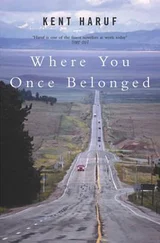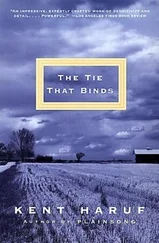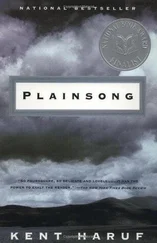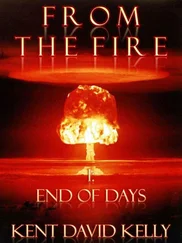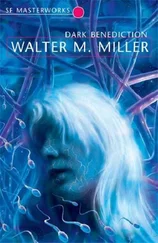Of course. I should of offered. He went behind the counter and returned with a coffeepot and two white mugs and poured the coffee and went behind the counter again and through the swinging door into the kitchen.
Franklin, Dad said. Is that what he’s calling himself?
I don’t know, she said. Do you want some cream?
He didn’t bring us any.
I know. She got up and looked at the tables, then leaned over the counter and found a little metal pitcher.
This looks fresh, she said.
She sat down again. Dad poured cream into his coffee and looked in his cup and sipped at it.
Is it all right?
He nodded.
Then Frank came out through the kitchen door. He saw them and came over and stood beside their table. He was tall and very thin, his hair grown out long. There was a bruise on his cheek.
Well, you made it, he said. You’re too early for supper though.
That waiter let us know, Dad said. He called you Franklin.
That’s what I call myself now.
Why would you do that?
Because. I’m making changes. That’s part of it.
Changing your name.
That’s right.
It isn’t what you were born with.
I know. That’s the point, Dad.
Dad looked out across the street at the used-car lot.
How long will you be here? Frank said.
We have to go back tonight, Dad said. He turned back.
Lorraine’s at home on Christmas break, Mary said. We don’t want to be away while she’s there.
We don’t close till eight and I have to help clean up. So it’ll be late.
We can wait for you, Mary said. She looked at Dad. Can’t we.
They won’t let you off any earlier? he said.
They might but I don’t want to lose this job. I’ve just had it a month. Do you want anything to eat?
I guess we can get some hamburgers, Dad said.
You want some chips too?
You don’t have any fries?
Not yet.
Frank left and went back to the kitchen.
He looks too thin, Mary said.
He always was thin. He’s probably always going to be thin.
You saw that bruise on his cheek?
He must of got hit, Dad said. In a fight or something.
Why would someone want to hit Frank?
I advise you not to ask him.
I know. I don’t intend to.
Maybe it wasn’t too bad, Dad said. Maybe he didn’t get the worst of it.
Frank came back carrying two thick crockery plates with the hamburgers and chips, lettuce and tomato and onion on the side. He stood for a while next to the table, talking. Then a boy about his age came out from the kitchen and stood beside him.
This is Harlan, Frank said. He wanted to meet you.
How do you do, Mary said.
The boy reached and shook her hand. His hair was long too.
This is my dad, Frank said.
He shook Dad’s hand. You’re from here in Denver? Dad said.
Yes, sir. I was working here before Franklin ever started.
Then you’ve been here a while, Mary said.
Too long. He looked at them. Well, it’s good to meet you. I’ve got to get back to the kitchen. He popped Frank on the back of the head and Frank turned and said, You better be careful, you might get in trouble, boy. The boy laughed and went back through the door. Frank watched him until he was gone and then looked at his parents. They were looking at each other. Then two women and a man entered the café and Frank went to meet them. They watched him and it was clear that he was good at meeting people, and soon the café got busy. Outside the light began to weaken along the street and Dad and Mary ate their food and when Frank came back they ordered pie and presently he brought the pie and set it down.
I asked Howard. He said I could get off at seven thirty if we aren’t too busy.
A half hour earlier than usual, Dad said.
Yes, plus missing out on cleanup. What do you want to do?
We’ll meet you out front, Dad said.
When they finished eating they left money on the table and went out to the car and drove to Civic Center. Colored lights were shining up from big lamps, flooded onto the fronts of the government buildings. Dad parked and they walked along the sidewalk in front of the buildings with other people, the families and their kids in heavy coats and caps. The buildings were all lit up for the holiday and the trees had colored lights strung in the bare branches. They walked by the museum and the public library and back to the car. They were sitting on the side street near the café for an hour before Frank came out. They waited and looked at the car lot and watched the diners through the big windows and saw Frank working at the tables. Everybody was eating and talking and they could see Frank talking. They all looked festive and happy.
It’s after seven thirty, Dad said.
He’s still busy, Mary said.
Then Frank finally came out. He was only wearing a thin jacket with a long dirty scarf wrapped around his neck, he got in the backseat and they drove over to his apartment.
The street was dark with old tall wooden houses. One of the street lamps was broken out at the corner. They got out and Frank used his key and they climbed the stairs to the third floor, where there was a wide bare hallway with a single shared bathroom. Frank’s apartment was just one room looking out onto the dark street, with a narrow bed and a chest of drawers and a curtain hung across the corner for a closet, with an electric hot plate on a stand and a half-size refrigerator, a bare table and two chairs. A poster of the night lights of New York was taped on the wall. Opposite was a poster showing an Indian girl above a caption that said Better Red Than Dead.
Sit down, Frank said. I can make you tea or coffee.
Tea would be good, his mother said.
They sat at the table and Frank put a pan of water on the electric burner and got out tea and sugar, then stood and waited for it to boil. Dad was looking at the poster across the room. You believe that? he said.
What?
What that poster says.
I don’t want to kill anybody, Frank said.
That’s not what I’m talking about.
Don’t worry, Dad. My lottery number’s a low one. They’re not going to call me.
When did you hear that? Mary said.
A couple months ago.
You didn’t tell us. We’ve been worried.
I got lucky.
The water boiled and Frank poured out three cups and they made their tea. He took his across the room and sat on the bed.
It was warm in the room. They looked around at the spare furnishings.
Have you seen your sister lately? Mary said.
She came down and stayed a weekend with me. And I went up to Fort Collins.
She seems to be doing all right. Don’t you think?
Yeah. She’s good.
Have you decided if you’re coming home for Christmas at all? We’d like to see you.
I have to work, Mom.
You can’t get off for even one day?
Maybe. I’ll have to see what he tells me. We’ll see.
That means you won’t, Dad said.
It means I don’t know, Frank said.
He got up and carried his cup back across the room.
Are you done?
He took their cups and stacked them in the little sink in the corner.
I’ve got you something for Christmas, Mary said. I didn’t know what you needed. She opened her purse and took out an envelope, she’d written his name on it in red ink and handed it to him and he opened it, a Christmas card with a fifty-dollar bill inside.
Thank you, Mom. He bent and kissed her. You too, Dad.
You’re welcome.
I’m sorry I didn’t get you anything.
It doesn’t matter, honey.
I think I’ll go down and get the car warmed up, Dad said.
Do we have to go so soon?
It’s late. We still have two and a half hours of driving ahead of us.
Dad looked at Frank. I’ll see you, he said, take care of yourself, and he went out the door and they heard him going down the wood stairs.
Читать дальше


